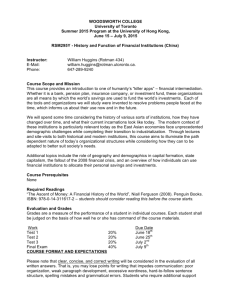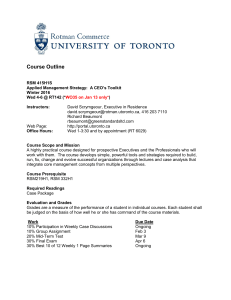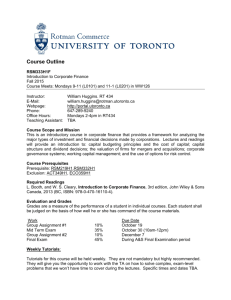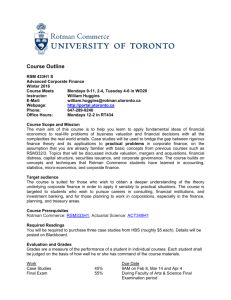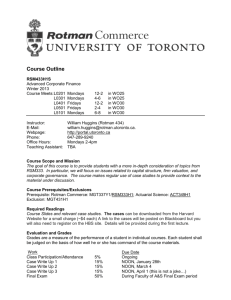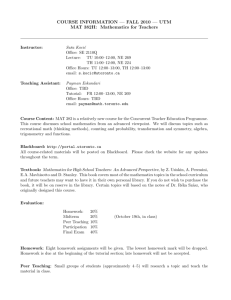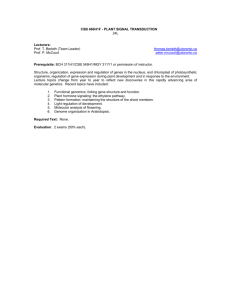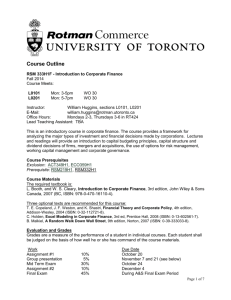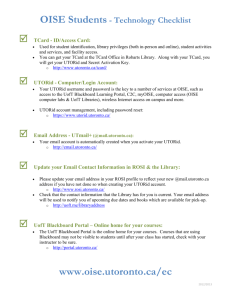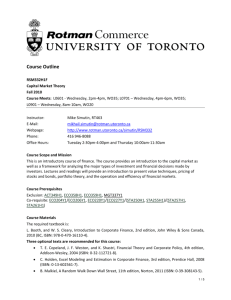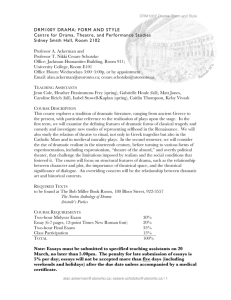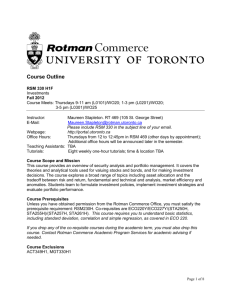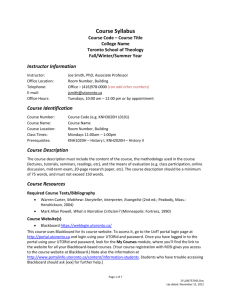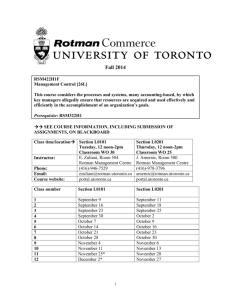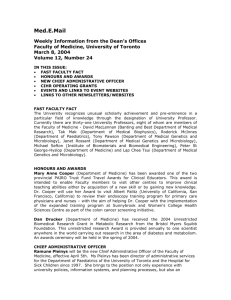Course Outline - University of Toronto
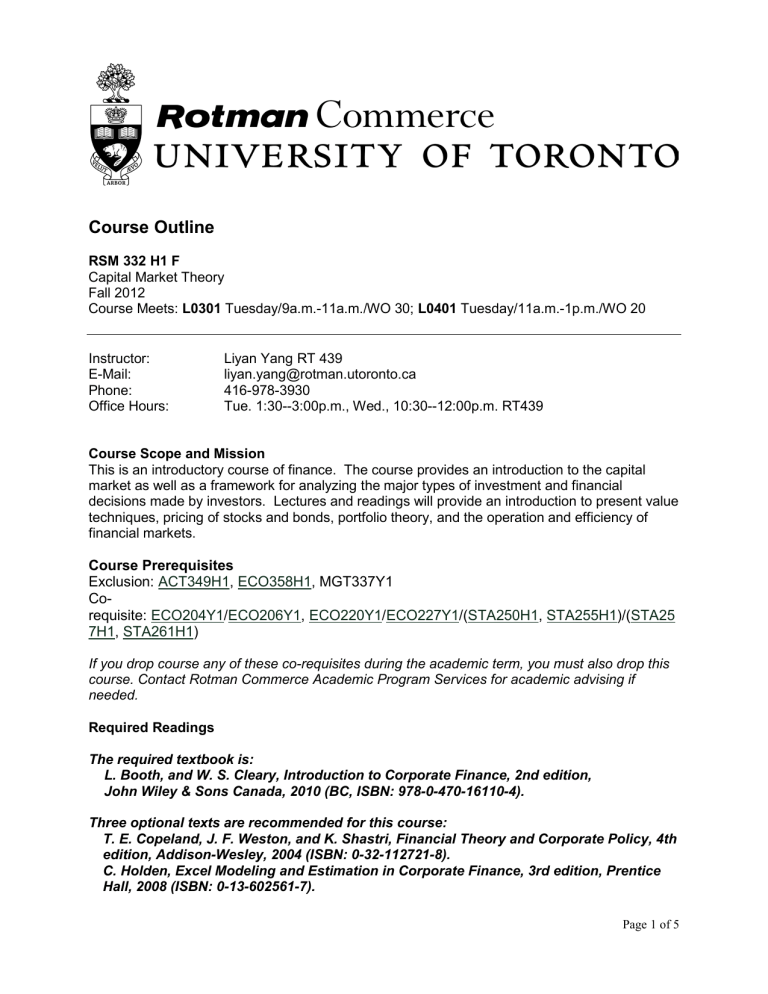
Course Outline
RSM 332 H1 F
Capital Market Theory
Fall 2012
Course Meets: L0301 Tuesday/9a.m.-11a.m./WO 30; L0401 Tuesday/11a.m.-1p.m./WO 20
Instructor:
E-Mail:
Phone:
Office Hours:
Liyan Yang RT 439 liyan.yang@rotman.utoronto.ca
416-978-3930
Tue. 1:30--3:00p.m., Wed., 10:30--12:00p.m. RT439
Course Scope and Mission
This is an introductory course of finance. The course provides an introduction to the capital market as well as a framework for analyzing the major types of investment and financial decisions made by investors. Lectures and readings will provide an introduction to present value techniques, pricing of stocks and bonds, portfolio theory, and the operation and efficiency of financial markets.
Course Prerequisites
Exclusion: ACT349H1 , ECO358H1 , MGT337Y1
Corequisite: ECO204Y1 / ECO206Y1 , ECO220Y1 / ECO227Y1 /( STA250H1 , STA255H1 )/( STA25
7H1 , STA261H1 )
If you drop course any of these co-requisites during the academic term, you must also drop this course. Contact Rotman Commerce Academic Program Services for academic advising if needed.
Required Readings
The required textbook is:
L. Booth, and W. S. Cleary, Introduction to Corporate Finance, 2nd edition,
John Wiley & Sons Canada, 2010 (BC, ISBN: 978-0-470-16110-4).
Three optional texts are recommended for this course:
T. E. Copeland, J. F. Weston, and K. Shastri, Financial Theory and Corporate Policy, 4th edition, Addison-Wesley, 2004 (ISBN: 0-32-112721-8).
C. Holden, Excel Modeling and Estimation in Corporate Finance, 3rd edition, Prentice
Hall, 2008 (ISBN: 0-13-602561-7).
Page 1 of 5
B. Malkiel, A Random Walk Down Wall Street, 11th edition, Norton, 2011 (ISBN: 0-39-
308143-5).
Evaluation and Grades
Grades are a measure of the performance of a student in individual courses. Each student shall be judged on the basis of how well he or she has command of the course materials.
Work
Mid Term Exam 35%
Due Date
Oct. 23
Assignments
Final Exam
10%
55%
Oct. 16 (assignment 1);Dec.4 (assignment 2)
During Faculty of Arts & Science Final
Examination period
COURSE FORMAT AND EXPECTATIONS
There will be one midterm counting for 35% and one final examination counting for 55% of the course grade. For the examinations, you are allowed to bring in a calculator and an 8(1/2)′′×11′′ single-sided "crib" sheet on which you may write down whatever you wish. If the sheet is typed or contains photocopied materials, the font size has to be 10 point or larger. If you miss an examination, it is important that you inform me and the commerce office right away. In case you miss the examination for legitimate reasons, a makeup test will be given.
In addition, there will be two problem sets, covering different topics in the course. Doing these problem sets is essential to obtain a good understanding of the course materials. These problem sets are to be turned in and graded (each problem set will receive a grade of 0--4, where 0 gets no credit and 4 gets 100% credit). The two problem sets count for 10% of the final grade and they will be important determinants in borderline cases. You are encouraged to work in groups on the problem sets. You should, however, independently write up your own assignment.
Assignments are due at the start of the class and late ones are not accepted. Except for unusual circumstances, grades on homework assignments are final and regrading requests will not be accepted.
I will provide useful information (including lecture notes and solutions to homework assignments and old examinations) of the course through the UofT portal webpage. In order to access the portal webpage, you'll need your UofT ID to log on at http://weblogin.utoronto.ca/, and then go to http://portal.utoronto.ca
. If you have questions, please send me emails from your UToronto email address.
Xiaofei Zhao (E-mail: xiaofei.zhao08@rotman.utoronto.ca), the lead TA for the course, will hold three weekly tutorials. Days and Locations are TBA.
The first tutorial will start on September 20 and the last one will be on Dec. 7. Xiaofei will maintain a website, 332ta.raykan.com, where he will post some useful materials (including old exams).
Page 2 of 5
Weekly Schedule ( EXAMPLE )
Session Date
1 Sep. 11
Topic
Introduction
Readings
Introduction to the course: BC (Ch.1--2)
(Note: if you need a refresh financial accounting,
review Ch.3 and Ch.4.1--4.7 as well)
2 Sep 18
3
4
5
6
7
8
Sep 25
Oct 2
Oct 9
Oct 16
Oct 23
Oct 30
Financial Markets and Net Present Value Fisher's Separation Theorem
Present Value Concepts
Valuation of Stocks
Risk and Return
Mathematics and application of present value:
BC (Ch.5)
Bonds and introduction to theory of term structure
Bond Valuation and Term Structure Theory of interest rates: BC (Ch.6, excluding appendix)
Common stock valuation and growth opportunities:
BC (Ch.4.8, Ch.7)
T rade-off between risk and return, statistics review: BC (Ch.8.1--8.3, 8.5)
*Due date of problem set #1
Midterm
Portfolio Theory
Midterm covers material up to Oct. 16
Time and Location are TBA.
Portfolio mathematics, diversification, efficient portfolios:
BC (Ch.8.4, Appendix 8.A, Ch.9.1).
9 Nov 6
10 Nov 20
Capital Asset Pricing Model
Arbitrage Pricing Theory
Introduction to the CAPM: BC (Ch.9.2--9.3)
Factor models and the arbitrage pricing theory:
BC (Ch.9.4)
11 Nov 27
Operation and Efficiency of Capital Markets Efficient market hypothesis: BC (Ch.10)
12 Dec 4
Final Exam TBA by FAS
Course Review
Due date of problem set #2
Page 3 of 5
POLICY AND PROCEDURE
Accessibility Needs
The University of Toronto is committed to accessibility. If you require accommodations for a disability, or have any accessibility concerns about the course, the classroom or course materials, please contact Accessibility Services as soon as possible: disability.services@utoronto.ca
or http://www.accessibility.utoronto.ca/ .
Academic Integrity
Academic Integrity is a fundamental value essential to the pursuit of learning and scholarships at the University of Toronto. Participating honestly, respectively, responsibly, and fairly in this academic community ensures that the UofT degree that you earn will continue to be valued and respected as a true signifier of a student's individual work and academic achievement. As a result, the University treats cases of academic misconduct very seriously.
The University of Toronto’s Code of Behaviour on Academic Matters http://www.governingcouncil.utoronto.ca/policies/behaveac.htm
outlines the behaviours that constitute academic misconduct, the process for addressing academic offences, and the penalties that may be imposed. You are expected to be familiar with the contents of this document. Potential offences include, but are not limited to:
In papers and assignments:
•
Using someone else's ideas or words without appropriate acknowledgement.
•
Submitting your own work in more than one course without the permission of the instructor.
•
Making up sources or facts.
•
Obtaining or providing unauthorized assistance on any assignment (this includes collaborating with others on assignments that are supposed to be completed individually).
On test and exams:
•
Using or possessing any unauthorized aid, including a cell phone.
•
Looking at someone else's answers
•
Misrepresenting your identity.
•
Submitting an altered test for re-grading.
Misrepresentation:
•
Falsifying institutional documents or grades.
•
Falsifying or altering any documentation required by the University, including (but not limited to), medical notes.
All suspected cases of academic dishonesty will be investigated by the following procedures outlined in the Code of Behaviour on Academic Matters. If you have any question about what is or is not permitted in the course, please do not hesitate to contact the course instructor. If you have any questions about appropriate research and citation methods, you are expected to seek out additional information from the instructor or other UofT resources such as College Writing
Centres or the Academic Success Centre.
At times, the course instructor may decide to communicate important course information by email. As such, all UofT students are required to have a valid UTmail+ email address. You are
Page 4 of 5
responsible for ensuring that your UTmail+ email address is set up AND properly entered on the
ROSI system. For more information please visit http://help.ic.utoronto.ca/category/3/utmail.html
Forwarding your utoronto.ca email to a Hotmail, Gmail, Yahoo or other type of email account is not advisable. In some cases, messages from utoronto.ca addresses sent to Hotmail, Gmail or
Yahoo accounts are filtered as junk mail, which means that important messages from your course instructor may end up in your spam or junk mail folder.
Blackboard and the Course Page
The online course page for this course is accessed through Blackboard. To access the course page, go to the UofT Portal login at https://portal.utoronto.ca/ and log in using your UTORid and password. Once you have logged in, look for the My Courses module where you’ll find the link to all your course websites. If you don’t see the course listed here but you are properly registered for the course in ROSI, wait 48 hours. If the course does not appear, go to the Information
Commons Help Desk in Robarts Library, 1st floor, for help, or explore the Portal Information and
Help at www.portalinfo.utoronto.ca/students and review the Frequently Asked Questions.
Recording Lectures
Lectures and course materials prepared by the instructor are considered by the University to be an instructor’s intellectual property covered by the Canadian Copyright Act. Students wishing to record a lecture or other course material in any way are required to ask the instructor’s explicit permission, and may not do so unless permission is granted (note: students who have been previously granted permission to record lectures as an accommodation for a disability are, of course, excepted). This includes tape recording, filming, photographing PowerPoint slides,
Blackboard materials, etc.
If permission is granted by the instructor (or via Accessibility Services), it is intended for the individual student’s own study purposes and does not include permission to “publish” them in anyway. It is absolutely forbidden for a student to publish an instructor’s notes to a website or sell them in any other form without formal permission.
Page 5 of 5
